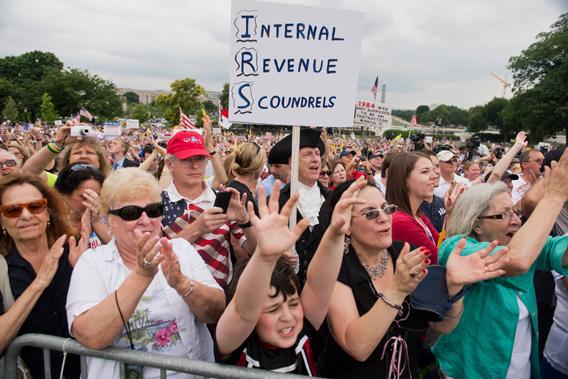The single most important politician at Wednesday’s Tea Party rally against the Internal Revenue Service spoke for less than two minutes. He wasn’t drowned out by applause, either. Michigan Rep. Dave Camp was merely explaining how he was going to shoehorn the IRS scandal into the headlines and cable news chyrons again.
“My committee was trying to get answers from the IRS for two years,” said Camp, the chairman of the tax-writing Ways and Means Committee. “We know that conservative donors were threatened with gift taxes. Conservatives had confidential tax information leaked.”
This was not the scandal that stirred the Tea Party one month ago. Sure, the scandals sound similar, and for Camp to succeed, one story needs to bleed into the other like two murals caught in the rain. They need to because the theory that President Obama ordered his IRS to slow-walk the applications of Tea Party groups has been methodically shredded by Democrats on the House Oversight Committee—or maybe just by the facts of the case.
Democrats took back the story last week, when they made a counterintuitive request for more information from Rep. Darrell Issa. The House Oversight chairman had asked for the initial inspector general report on the IRS after Tea Party groups complained (with merit) that they were getting irksome, obsessive questionnaires about their groups. There was a scandal there about the biases of bureaucrats, but Republicans, naturally, attempted to solve the case deductively. They knew what President Obama thought about the Tea Party, and they knew Democrats had wanted to challenge the tax exemptions of conservative “educational” groups, mega-PACs with nonprofit status. Surely there was a smoking gun somewhere in the files.
There wasn’t. Democrats challenged Republican investigators to publish their long-form interviews with IRS agents. On Tuesday, the Democrats did it themselves and publicized an interview with a witness who, when asked about a Politico story that suggested Issa had overreached in his investigation, absolved the White House.
“Was the decision to screen and centralize the review of Tea Party cases the targeting of the president’s political enemies?” asked the investigator.
“I do not believe that the screening of those cases had anything to do other than consistency and identifying issues that needed to have further development,” replied the witness.
Issa pronounced himself “deeply disappointed,” because the interview might work as “a roadmap for IRS officials to navigate investigative interviews with Congress.” Democrats, he said, were “flailing” because they’d been “unsuccessfully trying to convince the American people that IRS officials in Washington did not play a role in inappropriate scrutiny of Tea Party groups.” And that was part of the story, but it wasn’t the part Democrats were trying to debunk. They wanted to let the White House slide. Hey, look—it worked.
And so the focus has slid over to Camp. He’s attempting to broaden the focus of a probe and ask whether any IRS audits of individuals—not of groups—were conducted on orders from the Obama administration. The conservative media has been on that story almost as long as Camp has, with Wall Street Journal columnist Kimberley Strassel arguing that “an Obama campaign website [that] named and slurred eight Romney donors” effectively turned the IRS loose on them. The National Organization for Marriage has sued the IRS over the 2012 leak of its tax documents to the pro-gay Human Rights Campaign; at Wednesday’s rally in Washington, D.C., National Organization for Marriage president Brian Brown declared that the IRS “took our private tax information and gave it to the co-chair of Barack Obama’s campaign!”
If just one story bears out and the White House called in an audit, the fallout would devastate the administration. So the hunt continues, and the argument slowly evolves from “they targeted tax exemptions” to “they audited conservatives.” Texas Sen. Ted Cruz used his speech at the rally to stoke sympathy for the campaign donors, those who dared “to speak up, to bundle, to contribute, to participate.”
A crowd of thousands cheered—for high-dollar campaign bundlers. An Obama-led campaign to audit conservatives is the sort of fact you hardly need to prove. An Ohioan named George Brunemann told the crowd that he’d been hassled by the taxman and that “the IRS agent who audited me said, ‘You are being audited because of your association with the South Cincinnati Tea Party.’ ” (In interviews back home, he’s described this agent as “almost apologetic.”) Iowa Rep. Steve King, who got to Congress a decade ago, said he entered politics after “the IRS audited me one too many years in a row.”
This sentiment is winning. Republicans argue that the Justice Department and FBI are too compromised to conduct this investigation, and they’ve got some running room. Last week, when Public Policy Polling asked whether Attorney General Eric Holder should resign, only 34 percent said no and 41 percent said yes. A CNN poll this week logged an even better result; the percentage of people convinced that the White House “ordered the IRS” to send in the Stasi had surged by 10 points since May.
The sentiment thrived in Wednesday’s crowd, too. Gene McIlhone, who’d written “DEATH + TAXES IN ONE FELL SWOOP” on his poncho, thought about the last fortune cookie he’d cracked open. The piece of paper inside read: “A master can direct without speaking.” That said it all about Obama. “He hired the kind of people who knew what they had to do,” and he “will go down in history as the greatest Marxist who ever lived.”
Carol Lennon had drove from Clearwater, Fla., to make the rally—17 hours, overnight. Her brother-in-law’s auto-body shop was targeted by the IRS, and she knew it was because he donated to the Tea Party. What was the president’s role? “Even if he doesn’t come out and say it,” she said, “they know that’s what he wants.”
